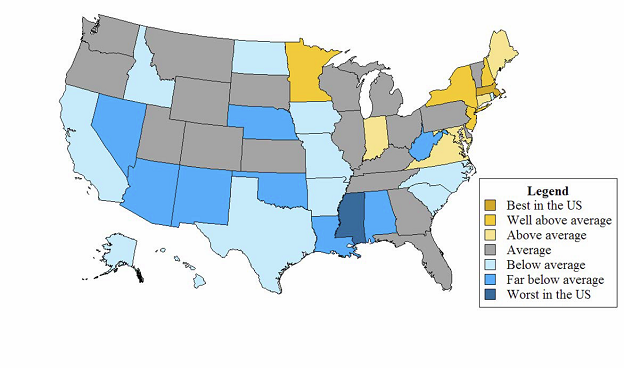States Ranked Best to Worst on Science Education

A new ranking of how well the United States' schools are preparing students for science and engineering careers shows that although there's a small number of high performers, most states are doing a poor job of educating students in these subjects.
According to the ranking of schools teaching kindergarten through 12th grade, Massachusetts leads the pack with a score of 4.82 on a scale of 1 to 5, while Mississippi trails behind as "worst in the United States" with a 1.11 score. Twenty-one states in total, including California, earned what the ranking classified as "below average" or "far below average" scores, and only 10 states earned scores above the national average of 2.82.
"We're not trying to criticize the states at the bottom," said Susan White of the Statistical Research Center at the American Institute of Physics, who developed the new Science and Engineering Readiness Index (SERI) ranking system with physicist Paul Cottle of Florida State University. "But states need to know how they're doing in order to improve." [See Full State-by-State Rankings]
Unlike other state rankings of science education that concentrate on making all students scientifically literate, the SERI uniquely focuses on the high school subjects physics and calculus, which research shows are most imperative to future scientists and engineers.
Physics education is important not only because it prepares students to enter high-paying professions, but also because it is vital to maintaining U.S. economic competitiveness in growing fields such as clean energy and biotechnology, Cottle said.
The SERI was calculated using publicly available information, including Advanced Placement results, National Assessment of Educational Progress reports, teacher certification requirements by state and data on high school physics class enrollment gathered by the American Institute of Physics.
The rankings are reported in the summer 2011 issue of the American Physical Society's Newsletter of the Forum on Education.
Sign up for the Live Science daily newsletter now
Get the world’s most fascinating discoveries delivered straight to your inbox.
You can follow LiveScience writer Remy Melina on Twitter @remymelina. Follow LiveScience for the latest in science news and discoveries on Twitter @livescience and on Facebook.












